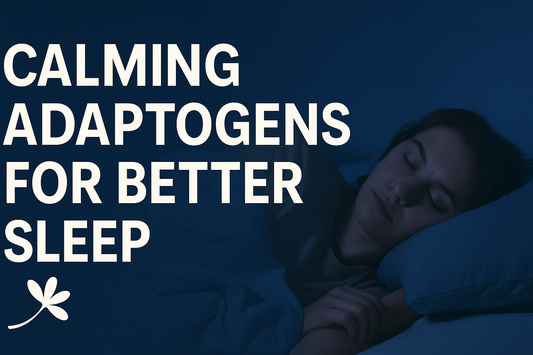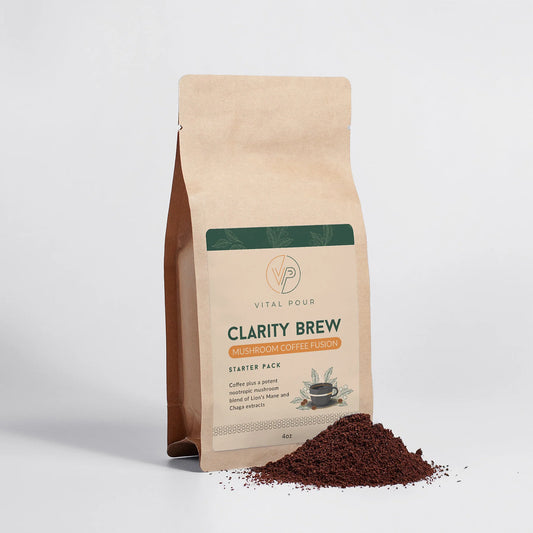A Deep Dive into Caffeine, Benefits, and Experience
Mushroom Coffee vs. Regular Coffee vs. Tea — which one actually supports your focus, energy, and long-term wellness the best?
Here’s the quick answer: mushroom coffee usually contains less caffeine than regular coffee, offers unique adaptogenic benefits, and delivers a smoother, more balanced energy boost than both traditional options. But there’s a lot more to the story.
In this guide, we’ll break down how mushroom coffee compares to your usual brews — from caffeine levels and health perks to taste and ritual — so you can confidently decide what deserves a place in your daily routine.
Understanding the Contenders
Before we dive into comparisons, let's briefly define each beverage:
- Regular Coffee: Brewed from roasted coffee beans, it's known for its rich aroma, bold flavor, and significant caffeine content. It's a global favorite for boosting energy and alertness.
- Tea: Made by steeping the leaves of the Camellia sinensis plant (for true teas like black, green, oolong, and white) or various herbs, fruits, and spices (for herbal teas). Tea offers a wide spectrum of flavors, caffeine levels (or no caffeine in the case of most herbal teas), and health benefits.
- Mushroom Coffee: This innovative beverage typically combines regular coffee (often at a reduced ratio) with extracts from medicinal mushrooms such as Lion's Mane, Chaga, Reishi, and Cordyceps. It aims to deliver the energizing effects of coffee while mitigating some of its downsides and adding the adaptogenic and nootropic benefits of the mushrooms.
If you’re curious how this feels in real life:
“I used to crash hard by 2 p.m. after my second cup of coffee. We knew there had to be a better way — so we started experimenting. We tested different blends, adjusted the caffeine, and added functional mushrooms until we finally landed on something that actually worked. Switching to Vital Pour’s Mushroom Coffee Fusion changed everything. I still get that satisfying morning ritual, but now I feel clear-headed and steady all the way through my afternoon meetings.”
Caffeine Content: The Jolt Factor
Caffeine is often the primary driver for choosing a morning beverage. Here's how our contenders stack up:

| Beverage | Average Caffeine (8oz) | Energy Impact |
|---|---|---|
| Regular Coffee | 80–100 mg | Fast, strong — but may crash |
| Black Tea | 40–70 mg | Milder buzz, smoother taper |
| Green Tea | 20–45 mg | Gentle lift, relaxing focus |
| Mushroom Coffee (like Vital Pour) | 40–50 mg | Balanced lift, no jitters or crash |
- Regular Coffee: An average 8-ounce cup of brewed coffee typically contains 80-100 milligrams (mg) of caffeine, though this can vary significantly based on the type of bean, brewing method, and serving size. Some espresso shots or larger servings can contain much more.
-
Tea: Caffeine content in tea varies widely.
- Black Tea: Generally contains 40-70 mg per 8-ounce cup.
- Green Tea: Typically has 20-45 mg per 8-ounce cup.
- White Tea: Contains the least caffeine among true teas, around 15-30 mg.
- Herbal Teas (e.g., chamomile, peppermint, rooibos): Most are naturally caffeine-free.
- Mushroom Coffee: One of the key selling points of many mushroom coffee brands is a lower caffeine content compared to regular coffee. By blending coffee beans with mushroom extracts (which are caffeine-free), the overall caffeine per serving is often reduced by about half. An 8-ounce cup of mushroom coffee might contain around 40-50 mg of caffeine. This can provide a gentler energy lift without the intense jitters or potential crash associated with higher caffeine doses.
The Takeaway on Caffeine: If you're seeking a strong caffeine hit, regular coffee remains the top choice. For a moderate, sustained boost with potentially fewer side effects, mushroom coffee offers an appealing alternative. Tea provides a spectrum, from moderate caffeine in black tea to very low or no caffeine in herbal varieties, catering to those with higher caffeine sensitivity or those looking for an evening beverage.
Health Benefits: Beyond the Buzz
Each beverage brings its own unique set of potential health advantages:
Regular Coffee: More Than Just Energy
Beyond its well-known energizing effects, regular coffee consumption has been linked to several health benefits when consumed in moderation:
- Rich in Antioxidants: Coffee is a major source of antioxidants, which help combat oxidative stress and may reduce the risk of certain chronic diseases.
- Improved Cognitive Function: Caffeine is a known stimulant that can enhance alertness, focus, concentration, and reaction time.
- Enhanced Physical Performance: Caffeine can increase adrenaline levels and improve physical endurance and performance.
- Potential Protection Against Certain Diseases: Studies have suggested links between coffee consumption and a reduced risk of type 2 diabetes, Parkinson's disease, Alzheimer's disease, liver disease (including liver cancer), and depression.
Potential Downsides: High caffeine intake can lead to jitters, anxiety, insomnia, digestive issues, and increased heart rate in sensitive individuals. Dependency and withdrawal symptoms are also common.
Tea: A Spectrum of Wellness
The health benefits of tea are vast and vary depending on the type:
- Rich in Antioxidants (Polyphenols): All true teas are packed with polyphenols like catechins (especially in green tea, like EGCG) and theaflavins (in black tea), which have powerful antioxidant and anti-inflammatory properties.
- Heart Health: Regular tea consumption has been associated with improved cardiovascular health, including lower blood pressure and reduced risk of heart disease.
- Brain Health: Compounds in tea, such as L-theanine (especially in green tea), can promote relaxation, reduce stress, and improve focus and cognitive function, often working synergistically with caffeine for a calm alertness.
- Immune Support: Certain teas possess antiviral and antibacterial properties.
- Digestive Aid: Some herbal teas, like peppermint or ginger tea, are well-known for their digestive benefits.
- Cancer Prevention: Some research suggests that the antioxidants in tea may play a role in preventing certain types of cancer, though more research is needed.
Potential Downsides: Overconsumption of highly caffeinated teas can lead to similar side effects as coffee. Some teas may interact with medications.
“I started Vital Pour after struggling with brain fog, especially when juggling work and parenting. Regular coffee gave me a short high but left me exhausted later. Now, I feel alert but not anxious, focused but calm. That shift alone was life-changing.”
Mushroom Coffee: The Adaptogenic Edge
Mushroom coffee aims to combine the benefits of coffee with the unique properties of medicinal mushrooms:
- Reduced Caffeine, Smoother Energy: As mentioned, lower caffeine content often means fewer jitters and a less pronounced energy crash. The mushrooms themselves are often touted as providing sustained energy.
- Adaptogenic Benefits: Many mushrooms used (like Reishi and Chaga) are adaptogens, which are natural substances believed to help the body adapt to stress, support adrenal function, and promote overall balance (homeostasis).
- Cognitive Enhancement (Nootropic Effects): Lion's Mane mushroom, a common ingredient, is particularly renowned for its potential to support brain health, enhance focus, memory, and cognitive function by stimulating nerve growth factor (NGF) production.
- Immune Support: Mushrooms like Chaga, Reishi, and Turkey Tail are rich in beta-glucans and other compounds known to modulate and support the immune system.
- Anti-inflammatory and Antioxidant Properties: Medicinal mushrooms are potent sources of antioxidants and possess anti-inflammatory properties, contributing to overall wellness.
- Improved Gut Health: Some mushroom extracts may have prebiotic effects, supporting a healthy gut microbiome.
- Enhanced Physical Performance (Cordyceps): Cordyceps mushrooms are often included for their potential to improve oxygen utilization, stamina, and athletic endurance.
Potential Downsides: High-quality mushroom coffee can be more expensive than regular coffee or tea. Research on the specific synergistic effects of coffee and mushroom blends is still emerging, though the individual components are well-studied. Individuals with mushroom allergies should avoid it.

If you try Vital Pour’s Mushroom Coffee Fusion, expect a familiar coffee flavor with a more grounded, mellow finish. It's ideal for your morning ritual, afternoon pick-me-up, or even pre-workout.
The Experience: Flavor, Aroma, and Ritual
- Regular Coffee: Offers a wide range of flavor profiles from dark and bitter to bright and acidic, depending on the bean origin, roast, and brewing method. The aroma is often rich and invigorating, and for many, the ritual of brewing and drinking coffee is a cherished part of the day.
- Tea: Presents an even broader sensory palette. Black teas can be malty and robust, green teas grassy or vegetal, oolongs floral or fruity, and herbal teas can range from minty and spicy to sweet and calming. The ritual of tea preparation can be a mindful and soothing experience.
- Mushroom Coffee: Many brands strive to create a flavor profile that is very similar to regular coffee, often described as smooth, earthy, or nutty, with little to no discernible mushroom taste. The mushroom extracts are typically processed to blend seamlessly. For those who enjoy the coffee ritual but want added functional benefits and less caffeine, it can be an excellent fit.
Which is Right for You?
Choosing between mushroom coffee, regular coffee, and tea depends on your individual needs, preferences, and health goals:
- Choose Regular Coffee if: You enjoy a strong caffeine kick, appreciate the classic coffee flavor, and are looking for a proven energy and focus booster (and are not overly sensitive to caffeine).
- Choose Tea if: You prefer a wider range of flavor options, desire varying levels of caffeine (including caffeine-free), and are interested in a broad spectrum of antioxidant and wellness benefits, or a calming ritual.
- Choose Mushroom Coffee if: You're looking for a way to reduce your caffeine intake without giving up the coffee experience, want the added cognitive, immune-supporting, and stress-reducing benefits of medicinal mushrooms, and prefer a smoother, more sustained energy lift.
| Goal | Best Fit |
|---|
| Maximum caffeine + alertness | Regular Coffee |
| Mild energy + variety | Tea (black or green) |
| Balanced focus + wellness | Mushroom Coffee like Vital Pour |
Ultimately, there's no single best choice for everyone. The ideal beverage for you hinges on your personal health objectives, sensitivity to caffeine, flavor preferences, and the type of daily ritual you wish to cultivate. It might even be that different beverages suit different times of day or different needs. Don't be afraid to experiment and listen to your body to discover what makes you feel your best. Whether it's the robust kick of coffee, the calming infusion of tea, or the balanced energy of mushroom coffee, the goal is to find a beverage that not only satisfies your taste buds but also supports your overall well-being.


